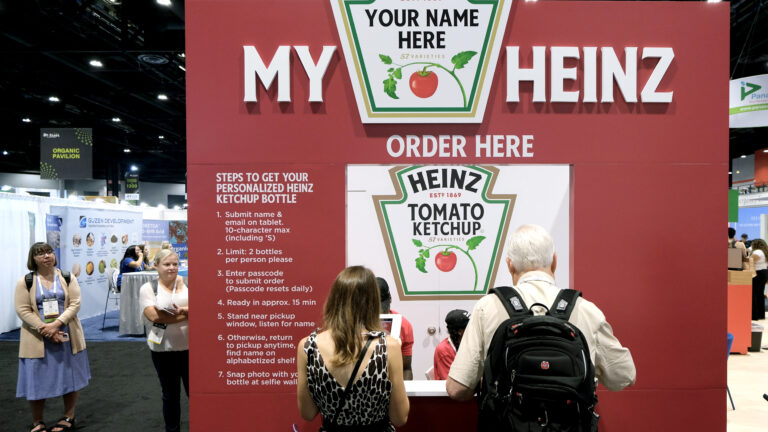CHICAGO — The annual gathering of food technologists offered a glimpse into the future of culinary creations — and the food industry’s sophisticated strategies for enhancing them. The exhibit hall showcased an array of products, from “Buttery Biscuits & Hot Honey Gravy” and mushroom jerky to plant-based frozen yogurt and chocolatey cookie dippers. What became clear was that these ultra-processed treats may be the real technology on display.

Before attending the IFT First conference, I knew companies design products to be hyperpalatable and filled with ingredients one might not recognize. Roughly 60% of American calories come from ultra-processed foods — industrial creations made up of ingredients you can’t find on a supermarket shelf. However, I wasn’t prepared to learn about the use of artificial intelligence in food design or watch marketers discuss the long-term impact of modern child-rearing techniques on snack cravings.
The IFT First conference, described as the “world’s leading food technology event,” drew approximately 17,000 attendees and highlighted the food industry’s awareness of health concerns surrounding ultra-processed foods. However, the industry is still focused on intentionally designing products so compelling they’re difficult to resist.
My experience, as delicious and maybe a bit deranged as it was, raised some urgent questions. When should companies be expected to start selling something healthier? Should they be praised for developing healthier versions of ultra-processed foods, even if they are still ultra-processed? And when does a well-made, irresistible snack cross over from addictive in the colloquial sense to being actually addictive?
“We won’t be debating the definition of ultra-processed foods,” an official of the Institute of Food Technologists, which hosted the conference, warned attendees at the start of a closing panel discussion. This underscored that even among experts, the understanding of ultra-processed foods is rudimentary. While overconsumption of these foods has been linked to serious health issues such as type 2 diabetes and colorectal cancer, scientists haven’t agreed on an accepted definition or a unified theory explaining the potential harm.
This lack of consensus has led to an industry divided in its views. Some reject concerns about ultra-processing as unscientific, suggesting it’s part of a trend that maligns certain diets as causing America’s expanding waistlines. Janet Helm, a food and nutrition consultant, stated at the conference, “The health benefit of a product is not solely related to the level of processing.”
Others acknowledge the research but argue that current findings are too basic to influence corporate strategies. “I don’t think we know what to change right now,” said Anna Rosales, the IFT official who led the panel on ultra-processed foods. Many companies are responding by selling slightly healthier versions to attract customers who have been following the headlines. Innova Market Insights, a firm that specializes in predicting food trends, informed conference attendees that these fears present “opportunities for growth.”
The exhibit hall overflowed with slightly healthier versions of classics. Plant-based frozen yogurt had pea protein and less sugar than usual, thanks to allulose. “For consumers of plant-based frozen desserts, ‘added protein’ is one of the top health and nutritional benefits they seek when choosing a product,” Ingredion, the manufacturer, advertised.
Scientists and public health officials offer educated guesses for the compelling appeal of ultra-processed foods. Some think they trigger brain chemical reactions like addictive drugs, or disrupt communication between the gut and the brain, leading to overeating. A range of societal and economic factors also contribute to popularity, including cost and easy availability, especially for those without time or resources for home cooking.
Food companies, with their teams of scientists and tools to manipulate smell, color, texture, and taste, can design food tailored to a person’s individual preferences. The strawberry champagne donuts lacked strawberries or champagne, relying on man-made flavoring. The biscuits and hot honey gravy featured “lipolyzed cream and ghee flavors.”
The cookie dippers, made by Cargill, contain “PalmAgility compound shortening,” advertised as being “less likely to get brittle when stored at low temperatures or greasy at high temperatures.” The plant-based frozen yogurt had maltodextrin plus a “frozen dessert stabilizer system” to maintain a creamy texture. The Mintel market intelligence agency highlighted the role of texture in snack cravings. Mintel data revealed that 80% of millennials reported that texture influences their snack cravings. This makes the food immediately appealing, and potentially a major factor in consumer decisions.
Were pretzel bits in a cookie really all that different from what I would do in my own kitchen? The food policy world is facing this exact question. Some see scientists working to create craveable products as sinister. Todd Wagner, the billionaire founder of FoodFight USA, an organization advocating against ultra-processed foods, stated, “Do the food companies know what is going on? Absolutely they do. They know it’s addictive, they know it’s got health consequences, this is very similar to cigarettes.”

Others see companies as simply larger versions of home cooks who might enhance flavors. Rosales, the IFT official, noted, “The last time I checked, anybody who makes a recipe, most of us make it because we want it to taste good. Even when I’m thinking of healthy food, I want those to be craveable.”
There’s no telling how many calories, sugar, and salt were consumed during my time in Chicago. But I never truly felt full, which is the secret — and the risk — of ultra-processed foods. A controlled trial found that subjects consumed more calories and gained more weight when given ultra-processed foods.
“There’s dozens of hypotheses out there, and very strong opinions” on the reasons for the overconsumption and weight gain, said Kevin Hall, a researcher for the National Institutes of Health.
The tendency to overeat may be tied to the theory that ultra-processed foods disrupt hunger hormones, or potentially digest faster than whole foods due to their low fiber content. By the end of my first afternoon, I admit I felt a wave of nausea. Ultimately, however, it was just hunger. I was ready for another snack.


